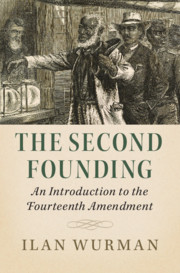Book contents
- The Second Founding
- The Second Founding
- Copyright page
- Dedication
- Contents
- Acknowledgments
- Note on the Cover
- Introduction
- Part I Antebellum Law
- Part II From Abridgment to War and Ratification
- 4 Abridgment of Rights before and after the Civil War
- 5 The Fourteenth Amendment
- 6 Privileges, Immunities, and Incorporation
- Part III The Modern Era
- Notes
- Index
5 - The Fourteenth Amendment
from Part II - From Abridgment to War and Ratification
Published online by Cambridge University Press: 30 October 2020
- The Second Founding
- The Second Founding
- Copyright page
- Dedication
- Contents
- Acknowledgments
- Note on the Cover
- Introduction
- Part I Antebellum Law
- Part II From Abridgment to War and Ratification
- 4 Abridgment of Rights before and after the Civil War
- 5 The Fourteenth Amendment
- 6 Privileges, Immunities, and Incorporation
- Part III The Modern Era
- Notes
- Index
Summary
This chapter argues that the Fourteenth Amendment deployed the antebellum legal language described in the first three chapters to solve the historical problems described in Chapter 4. It describes the reconstruction legislation of the Thirty-Ninth Congress – the Civil Rights Act of 1866, the Privileges and Immunities Bill of 1866, and the Freedmen's Bureau Act of 1866 – and shows how the framers of the Fourteenth Amendment sought to constitutionalize these pieces of legislation that would have solved the known historical problems of the times.
- Type
- Chapter
- Information
- The Second FoundingAn Introduction to the Fourteenth Amendment, pp. 93 - 103Publisher: Cambridge University PressPrint publication year: 2020

